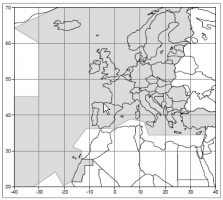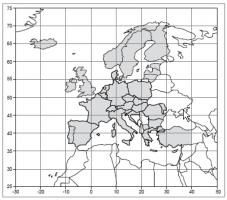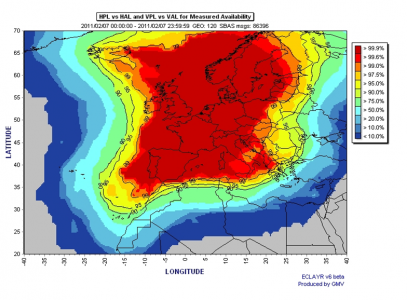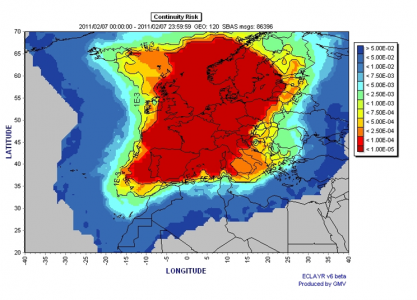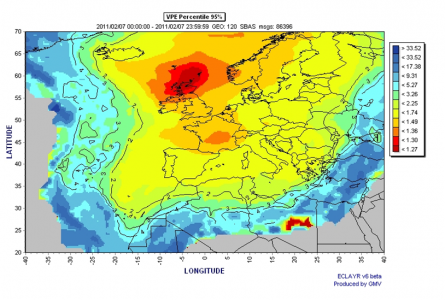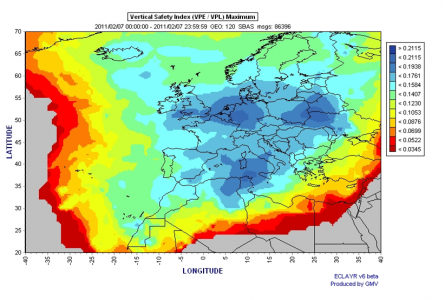If you wish to contribute or participate in the discussions about articles you are invited to contact the Editor
EGNOS Performances
| EGNOS | |
|---|---|
| Title | EGNOS Performances |
| Edited by | GMV |
| Level | Basic |
| Year of Publication | 2011 |
EGNOS (European Geostationary Navigation Overlay Service) is the European satellite-based augmentation service (SBAS) that complements the existing satellite navigation services provided by the US Global Positioning System (GPS) using the L1 C/A signal. EGNOS will augment both GPS and Galileo in the future (in EGNOS V3) using L1 and L5 frequencies.
EGNOS performances are usually described in terms of accuracy, integrity, availability and continuity.
EGNOS Performances Requirements
EGNOS has been designed to meet SBAS performance requirements for civil aviation operations down to Localizer Performance with Vertical Guidance (LPV) minima but EGNOS service might also be used in a wide range of other application domains (e.g. maritime, rail, road...):[1][2]
| Service | Service Coverage | Accuracy (95%) | Integrity | Continuity | Availability | ||||
|---|---|---|---|---|---|---|---|---|---|
| Lateral | Vertical | HAL | VAL | TTA | Integrity Risk | ||||
| Open Service | EU25 States (plus Norway and Switzerland) land masses | 3m | 4m | - | - | - | - | - | 99% |
| SoL En-route and NPA | Flight Information Regions (FIRs) of ECAC 96 | 220m | - | 556m | - | 10s | 1e-7/hour | 1e-5/hour | 99.9% |
| SoL APV-I | Land Masses of ECAC 96 | 16m | 20m | 40m | 50m | 6s | 2e-7/150s | 8e-6/15s | 99% |
Typical Performances
The typical performances provided by EGNOS are presented in the next figures. For the computation, the day 7th February 2011, considered to be a representative day, has bee selected. The actual EGNOS messages have been taken from the EGNOS Message Server. The images have been generated with the eclayr tool.
Availability: The figure shows EGNOS availability map together with the iso-lines of availability compliance to APV-I service level availability requirements (i.e., HPL < 40 m and VPL < 50 m). The period of analysis corresponds to one day with the inner iso-line delimiting the user locations where a service level over 99% availability is achieved.
Continuity: The figure shows EGNOS continuity map together with the iso-lines of continuity risk compliance to APV-I service level. The continuity risk is computed as the probability of having a continuity event (Protection Levels bigger than Alarm Limits) during a period of 15 seconds provided that the service was available (Protection Levels smaller than Alarm Limits) at the start of the period. The inner iso-line, 1e-4, delimits the user locations which did not have a single continuity event during the analyzed day.
Monitoring of EGNOS Performances
EGNOS performances are being monitored continuously by several entities, such as ESSP[3] and ESA.[4]
The EGNOS performance monitoring done by ESSP[3] includes figures on achieved availability, continuity and integrity. In addition, it forecasts the performances in terms of availability and integrity.
The monitoring done by ESA[4] is twofold. On the one hand, the messages, as broadcast by the EGNOS satellites, are analyzed to determine the status of several parameters, such as the GPS satellites which are augmented by EGNOS, the level of monitoring of the ionosphere over Europe or the achieved protection levels. On the other hand, ESA monitoring environment allows to select different reference stations and depicts the accuracy and integrity obtained for those sites.

